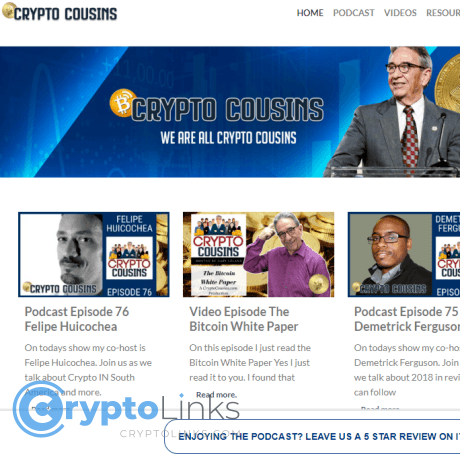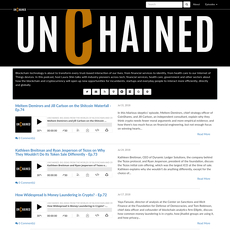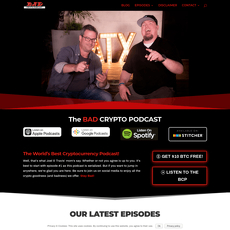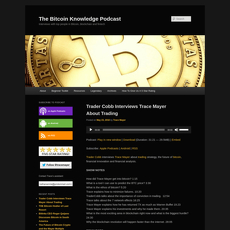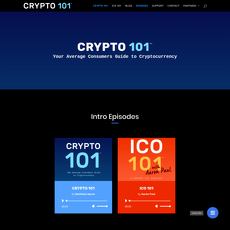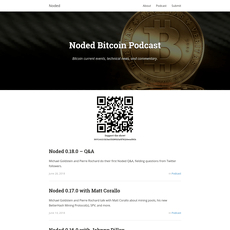Crypto Cousins Review
Crypto Cousins
cryptocousins.com
Crypto Cousins (cryptocousins.com) Review Guide: Everything You Need to Know + FAQ
Heard about Crypto Cousins and wondering if it’s actually worth your time—or just another podcast pushing sponsors and hot takes? Good question. With crypto, attention is your most valuable asset, and not every show deserves it.
I’ve spent years sorting signal from noise in crypto media. In this guide, I’ll keep it simple and practical so you can decide—fast—if Crypto Cousins belongs in your weekly routine.
Why most crypto media wastes your time
The crypto content firehose is real. The trouble isn’t finding content; it’s finding quality. Here’s what usually goes wrong:
- Mixed quality and hype: One episode sounds smart, the next is a thinly veiled shill for the “next 100x.”
- Unclear expertise: Hosts who talk loud but never show receipts—no track record, no depth, just vibes.
- Outdated advice: Old content lingers in search and podcasts. Fees change, wallets change, policies change—and you’re left with stale guidance.
- Long episodes, no takeaways: You sit through 45 minutes and leave with two notes you could’ve read in a 3-minute summary.
- Hidden incentives: Sponsorships and affiliate links aren’t always obvious, which can skew recommendations without you noticing.
Reality check: Sensational claims spread faster than the truth. A well-known study in Science (Vosoughi, Roy, Aral, 2018) showed false news travels farther and faster than true news online. In crypto, that effect gets amplified by financial FOMO and social echo chambers.
If you’ve ever clicked an episode that promised “insider alpha” and got 8 minutes of ads, 20 minutes of small talk, and zero specifics, you know the pain. So let’s set a better bar for Crypto Cousins.
What I’m going to do for you here
You’ll get a straight, hands-on review that answers the questions you actually care about:
- What Crypto Cousins is and how it’s positioned
- Who it serves best (and who should skip it)
- How I rate its content quality and trust signals
- How to get value in your first 10–30 minutes
- Pros and cons that really matter
- Smart alternatives to pair with it
No fluff, no hero worship, no witch hunts—just what works for real listeners who want to learn faster.
What you’ll walk away with
- A quick overview: What lives on cryptocousins.com and how to navigate it without clicking in circles.
- Host context: Why the person behind the mic matters and what that means for you.
- Practical use cases: When to listen, what to skip, and how to fit it into a sane crypto media diet.
- Monetization clarity: What’s sponsored, what’s not, and how to spot bias fast.
- Safety reminders: The simple checks that keep you from acting on bad or outdated info.
How I review crypto sites and podcasts
I use a consistent method so comparisons are fair and useful. Here’s the short list I run on every site and show:
- Transparency: Is it clear who’s behind it? Is there an About page, real names, and a way to contact them?
- Expertise: Does the host have a credible history—events, projects, research, or meaningful industry experience?
- Update cadence: Are episodes recent and consistent? Gaps aren’t always bad, but they change how you should use the archive.
- Usefulness by skill level: Can beginners follow along? Do intermediate listeners get something beyond basics?
- Monetization and disclosures: Are sponsors and affiliates clearly labeled? Do claims line up with incentives?
- Time-to-value: In 10–30 minutes, can you get at least one actionable insight, framework, or resource worth saving?
- Signal-to-noise: Minimal tangents, clear takeaways, useful show notes, and links that actually help.
- Safety posture: No “get rich quick” bait, no pressure to click sketchy links, and clear reminders that this isn’t financial advice.
One more thing I always check: recency-sensitive claims. In crypto, topics like exchange fees, wallet policies, mining economics, and regulatory notes age fast. If a show talks specifics without a date or source, I flag it.
Alright—now that you know how I approach this, let’s look at Crypto Cousins through that lens. Who runs it, what’s the angle, and what will you actually find on the site? That’s up next.
What is Crypto Cousins? The quick story and who’s behind it
Crypto Cousins is a long-running crypto media brand built around an easygoing podcast, supported by a straightforward site, YouTube, and social channels. The center of gravity is Bitcoin, but the conversations often spill into security, tools, and real-world lessons from people who’ve been in the trenches.
If crypto media sometimes feels loud and salesy, this is the quieter room where you can actually think. Episodes feel like you’re sitting at the table with folks who care about doing things the right way—self-custody, education, and staying level-headed when the market gets noisy.
“No price targets. No secret signals. Just conversations that help you get smarter.”
Who runs it and what’s the angle?
It’s led by Gary Leland—veteran creator, Bitcoin podcaster, and event host known for a friendly, practical style. The angle is simple: talk to builders, educators, and seasoned users; ask honest questions; leave the hype at the door. You’ll hear opinions, context, and education—not pumpy calls or “win-the-week” trading strategies.
Expect a Bitcoin-first lens. That means topics like self-custody, hardware wallets, mining, and Lightning show up often. It also means conversations are usually grounded in first principles rather than chasing the latest altcoin narrative. If you’re looking for level-headed thinking, that bias is a feature, not a bug.
What you’ll find on CryptoCousins.com
The site is clean and purpose-built for listening. Here’s what stands out when I browse:
- Podcast archives: A catalog of episodes with embedded players and short summaries you can scan fast.
- Episode pages: Typically include who’s on, what’s covered, and direct links to any tools or projects mentioned.
- YouTube and socials: Easy jumps to video versions and ongoing updates on X/Twitter and beyond.
- Occasional posts and project mentions: Notes about events, merch, or related initiatives you might want to track.
Typical topics you’ll run into:
- Security and self-custody: Cold storage basics, hardware wallet workflows, common mistakes to avoid.
- Bitcoin mechanics: Mining economics, halvings, fee markets, and why time preference matters.
- Tools and builders: Wallet creators, educators, and open-source contributors explaining why their work exists.
- Practical strategies: Dollar-cost averaging vs. chasing momentum, staying calm through volatility, and forming your own thesis.
I often use episodes here to sanity-check my thinking. A conversation with a miner on how energy pricing shapes profitability, or a wallet founder explaining threat models, tends to stick longer than a tweetstorm. That lines up with learning research too: Edison Research reports podcast listening continues to hit record highs (with roughly half of Americans tuning in monthly), and narrative formats are consistently linked with higher engagement and recall compared to raw fact-dumps.
Who it’s best for
Some people want fast signals. Others want durable understanding. This show leans hard into the second camp.
- Beginners to intermediate listeners: If you’re past the “what is Bitcoin?” stage but not trying to code a node from scratch, you’ll feel at home.
- Bitcoin-curious learners: Especially if you want to understand security, custody, and the mindset of long-term holders.
- Audio-first learners: If you learn well from stories and real voices during commutes or workouts, this format fits. Studies on narrative learning consistently show better retention when concepts are wrapped in stories people can relate to.
- Hype-averse folks: If you’re allergic to shilling, the conversational, steady tone will feel refreshing.
Quick gut check: If you want daily altcoin rotation and aggressive DeFi strategies, this probably won’t scratch that itch. If you want context that ages well—security, principles, and builder insights—it’s right on target.
Want a quick way to get value in minutes? In the next part I’ll show exactly where to click, which pages to open first, and a one-minute trick to pick great starting episodes. Curious which link gets you listening fastest?
Site walkthrough: how to use Crypto Cousins fast
You don’t need a weekend and ten tabs to figure out Crypto Cousins. In a few clicks, you can queue a relevant episode, skim show notes for key links, and decide if it fits your routine. Here’s the quickest path I use when I want signal without the scrolling fatigue.
“When everything in crypto moves fast, calm comes from controlling your inputs.”
Homepage and navigation
Head to cryptocousins.com. The layout is straightforward: a clean header, a menu that usually includes Podcast or Episodes, and the latest content front and center.
- Two-click start: Click Podcast or Episodes in the menu, then hit play on the most recent episode. If you prefer video, look for the YouTube button or thumbnail right on the homepage.
- One-page scanning: The homepage typically highlights new drops. I skim the top three titles—if I see Bitcoin security, wallet setup, or guest names I recognize, I open those first.
- Quick subscribe: Episode or sidebar icons usually link to Apple Podcasts, Spotify, or the show’s RSS. One tap and you’re set in your preferred app.
Small time hack: if you’re hunting for something specific, use your browser search on the homepage (Ctrl/Cmd + F) for keywords like “wallet,” “Lightning,” or “mining.” If the site doesn’t have a visible search box, type this into Google: site:cryptocousins.com wallet.
Podcast pages and players
Open any episode page and you’ll typically see a built-in player, a short summary, and guest or resource links. I treat this page like a control panel.
- 30-second skim: Read the summary and look for practical bits—wallet names, tools mentioned, links to guest sites, or episode timestamps.
- Start with recency: Newer interviews are better for current context (fees, network shifts, policy chatter). Then circle back to evergreen topics like wallet safety or seed phrase best practices.
- Play speed sweet spot: Studies suggest comprehension holds up well around 1.25–1.5x for most people watching or listening to educational content. Try 1.25x first; bump to 1.5x if you’re tracking fine.
- Note the links: Show notes often include the important stuff—hardware wallet brands, event references, or recommended reading. Open these in new tabs and save as you listen.
Micro-playbook I use:
- Open the latest relevant episode
- Skim show notes for 20–30 seconds
- Listen at 1.25x for 5 minutes
- If it clicks, queue two more episodes and subscribe
YouTube and social channels
If you learn better on video, click through to the YouTube channel from the site. There, you’ll find similar conversations with the benefit of visuals, chapters, and comments.
- Why YouTube: According to Edison Research’s Infinite Dial 2024, YouTube is the top platform people say they use for podcasts. Translation: easy discovery, easy playback, and a familiar interface.
- Watch faster, learn calmer: Turn on captions and set speed to 1.25x. Pause on key slides or definitions (e.g., multisig, Lightning channels) and grab screenshots for your notes.
- Community signals: A quick scan of comments can highlight standout tips or tools mentioned by the audience. It’s a decent filter for what resonated.
- Social updates: From the site, follow the official X/Twitter and other listed socials to catch new drops. Use Lists or “Favorites” to keep signal high and avoid imposter accounts—always click through from the site to verify the handle.
Finding what matters to you
You get the most value when you filter fast. Here’s how I zero in on what I care about without getting lost:
- Topic first, not timeline: Look at titles and show notes for keywords you actually need this week: hardware wallet, seed phrase, Lightning, mining, fees, self-custody.
- Search smarter: Use site:cryptocousins.com plus a topic in Google, or check the YouTube channel’s search bar for terms like “wallet” or “security.”
- Build a mini-queue: Pick one recent episode for timeliness, one security or wallet episode for evergreen learning, and one guest interview for perspective.
- Tag your takeaways: Keep a simple note with episode title, timestamp, and 1–2 actionable bits (e.g., “Switch to 12-word + passphrase,” “Try a small Lightning channel”).
If you only have 10 minutes during a commute or coffee break, this approach gets you real insights without the rabbit hole. And if you want to go even faster, try this quick filter:
- Fast filter: Newest episode → show notes skim → 5 minutes at 1.25x → decide to save or skip
Now, speed isn’t everything. What about the quality of these conversations, the bias, and whether you should trust the recommendations you hear? That’s exactly what I’m looking at next—along with update cadence and sponsor disclosures. Curious what I found?
Content quality, trust signals, and safety
Crypto conversations can either open your mind or waste your time. This one generally does the former. The tone is human, the angle leans Bitcoin-first, and the value comes from context and lived experience rather than hype. When I listen, I filter for four things: expertise, timeliness, how money flows, and whether the content keeps you safe.
Expertise and style
The hosting chops show. You’ll hear seasoned voices and story-driven interviews, with a focus on fundamentals—self-custody, security habits, Bitcoin history, and market mindset. It’s not a code tutorial or a trading signal factory, and that’s a strength if you prefer understanding over noise.
What makes the style work is how jargon gets translated into plain talk. I look for “receipts” during episodes—real experiences, not recycled talking points. When a guest explains how they secure keys, pay miners, or run nodes, I want specifics. Do they cite a wallet model and why? Do they talk about firmware versions? Do they admit trade-offs?
- Guest credibility check: Quick scan of the guest’s background (LinkedIn, GitHub, prior companies) before taking any claim seriously.
- Questions that earn trust: “What could go wrong?” “How do you verify that?” “What did you change after your first mistake?”
- Signals of depth: References to concrete tools (e.g., hardware wallet models, explorers like mempool.space), not just buzzwords.
“Extraordinary claims require extraordinary evidence.” — Carl Sagan
That quote is my mental guardrail. If someone promises 20% yield “risk-free” or claims a magic wallet, I expect proof—or I move on.
Timeliness and update cadence
Podcast archives are gold for evergreen concepts, but crypto has a fast half-life. I always check the date of the newest episode. If it’s current, great—subscribe. If there’s a gap, I treat the feed like a library and double-check any time-sensitive details.
Here’s what I verify when episodes age:
- Bitcoin fees and mempool conditions: These swing wildly. Cross-check with a live explorer before acting.
- Wallet features and firmware: Confirm on the official site or release notes; features change, and security improves.
- Exchange policies and KYC limits: These are often updated; always re-check the exchange’s support pages.
- Mining economics: Halving events, energy prices, and ASIC efficiency can make old profitability talk obsolete.
- Tax guidance: Rules vary by country and evolve; rely on current guidance from your jurisdiction.
A simple “staleness test” I use: Has there been a Bitcoin halving, a major protocol improvement, or a regulatory shift since the episode aired? If yes, re-validate the specifics. For instance, ETF approvals or fee spikes can change how practical some strategies sound.
Monetization and disclosures
Good creators keep the lights on with sponsors and affiliates. That’s normal. What matters is clarity. I expect sponsor mentions, discounts, or event tie-ins—and I want them labeled plainly so I know when I’m hearing an ad versus an opinion.
- Responsible signals: “This episode is sponsored by…,” visible disclosure on the page, and realistic benefit claims.
- What I scrutinize: Are claims testable? Does the host push back if a sponsor’s pitch sounds fluffy?
- Smart listener move: Treat promo codes as marketing, not validation. Check independent reviews and a project’s security history before using anything.
The Stanford Web Credibility Project has long noted that clear disclosures and up-to-date content boost perceived trust. In crypto, that’s doubly true. If I hear a sponsor pitch for a wallet, I still want to see independent audits, open-source repos, and a transparent security track record.
Safety basics (always worth a reminder)
Nothing you hear on a podcast is financial advice. It’s a starting point. Scams evolve faster than most content pipelines, and even well-meaning guests can be wrong or outdated. Regulators and incident reports consistently warn that social engineering and fake “support” accounts are a top vector for crypto theft—so build habits that protect you automatically.
- Never share your seed phrase. No staff member, sponsor, or guest needs it—ever.
- Re-type URLs for exchanges, wallets, and explorers. Avoid clicking links from comments or DMs.
- Use hardware wallets and enable 2FA (authenticator app, not SMS).
- Test with small amounts first, then scale. Sleep on decisions that involve moving funds.
- Verify claims with two sources (official docs plus a reputable community thread) before acting.
- Update devices and firmware on a schedule; old software is an attack surface.
As someone who’s watched countless cycles, I’ll say it out loud: the fastest way to lose money is to let urgency override skepticism. Confidence without verification is just hope wearing a cape.
So here’s the real question: is this show good enough to earn a spot in your weekly rotation—and where might it miss the mark for your goals? Up next, I’ll spell out the exact pros and cons, plus my take on who gets the most value and why.
Pros, cons, and my take as a reviewer
Here’s the quick, honest rundown so you can decide if Crypto Cousins earns a spot in your podcast queue.
What I like
- Clear, steady voice: The Bitcoin-first perspective cuts through noise. You get conversations, not hype reels.
- Approachable format: Real stories and plain-English explanations. Great for anyone who’s Bitcoin-curious or allergic to jargon.
- Commute-friendly learning: Episodes fit easily into a lunch break or drive, so you can learn without rearranging your day.
- Less fluff when you stick to recent episodes: The newer releases stay practical—self-custody, wallet safety, energy talk around mining, and “how this actually works” narratives.
- Guest-driven with useful war stories: Think small merchants trying Lightning at the point of sale, miners talking grid curtailment, or educators walking through seed phrase mistakes they keep seeing.
- Good evergreen shelf: Topics like keeping keys safe, spotting scams, or understanding Bitcoin incentives don’t expire fast. The archive helps you build foundations.
Why this format works: people learn faster from stories than from bullet-point lectures. Multiple studies in cognitive psychology have shown that narrative formats improve recall and understanding over time, especially when you listen in regular, short sessions. That steady cadence is where podcasts shine.
“Clarity beats hype. If I can’t explain it on a coffee break, I don’t trust it with my savings.”
Where it falls short
- Bitcoin-heavy lens: If you’re hunting altcoin rotations, DeFi yield strategies, or perp chart talk, this isn’t the best fit.
- High-level over step-by-step: Expect conversations, not screen-share tutorials. For multisig setups, node builds, or advanced tax workflows, you’ll want specialized guides or docs.
- Some episodes age: Fees, wallets, mining profitability, and exchange policies change. Older takes can feel stale—use them for principles, not specifics.
- Cadence can vary: If there’s a gap between episodes, the archive still has value—just verify time-sensitive details before you act.
Quick safety tip: when an episode mentions a specific wallet or feature, check the current app version and docs. UIs and policies shift fast in crypto.
Best use cases
- Big-picture grounding: Understand Bitcoin’s “why,” market psychology, and security habits that actually stick.
- Learning from seasoned voices: Hear founders, educators, and miners share pitfalls you can avoid—price-agnostic value.
- Cutting through narratives: Use it to sanity-check headlines around mining energy, regulation, or “Bitcoin is dead… again.”
- Onboarding friends: Hand a skeptical friend a relatable episode to replace FOMO with understanding.
- Balanced stack: Pair the podcast with a real-time news source and a focused wallet/security guide for hands-on steps.
Emotionally, this matters: markets prey on FOMO and panic. A calm, story-led Bitcoin podcast helps you build conviction and filter out noise—so you act on plans, not adrenaline.
Want a simple, no-stress way to test whether Crypto Cousins belongs in your weekly routine? Up next: a 10-minute plan and a few smart pairings that keep you informed without overwhelming your brain.
Get value in 10 minutes: simple plan + smart pairings
You don’t need hours to decide whether Crypto Cousins deserves a spot in your week. Give yourself 10 focused minutes, stick to a simple routine, and let the content prove itself. Short, consistent sessions beat weekend binges—research on microlearning and habit formation (think BJ Fogg’s “Tiny Habits” and edX’s study on short-form content engagement) shows small chunks reduce overload and boost retention.
10-minute starter plan
- Open the latest episode on CryptoCousins.com and skim the show notes for your interests: Bitcoin security, wallets, mining, self-custody, lightning.
- Press play at 1.2–1.5x. If your app has it, toggle “Trim Silence” (Overcast) or “Skip Silence” (Pocket Casts/Spotify). You’ll save ~20–30% time without losing clarity.
- Listen for 5–7 minutes. You’re gauging tone, guest quality, and signal-to-noise—does it feel practical and grounded?
- Capture 1 takeaway + 1 action in a note:
- Takeaway: “Cold storage still beats everything for long-term holdings.”
- Action (2 minutes): “Tonight, write a simple backup plan for seed phrase.”
- It clicks? Hit Follow/Subscribe in your podcast app and queue 2–3 recent episodes aligned with your interests.
- It doesn’t? No sweat—scroll one episode down and repeat the same 5-minute test.
Pro tip: Tiny habits compound. A 5-minute episode check + one micro-action beats a 2-hour “I’ll get to it someday” session.
Why this works: short, structured listening reduces decision fatigue and creates a repeatable loop you’ll actually stick to. Studies on microlearning and engagement (for example, edX/MIT’s research showing shorter segments drive higher completion) back the idea that “less, more often” outperforms “long, rarely.”
Pair it with complementary sources
Use Crypto Cousins for mindset, interviews, and big-picture clarity. Pair it with tools that keep you current and safe:
- Quick news pulse (2–3 minutes): After the episode, check a Bitcoin/crypto news feed for headlines. This keeps you updated without living in the news cycle.
- Wallet and security primer (5 minutes once a week): Read a short guide on backups, multisig, or passphrases. Treat any product mention as a starting point—verify before acting.
- On-chain reality check (1 minute): Look at fees or mempool congestion (e.g., mempool.space) before you make any wallet moves the episode inspired.
Sample weekly stack you can copy:
- Monday: 7 minutes of Crypto Cousins at 1.3x + 2-minute headline scan.
- Wednesday: 6 minutes of a security-focused episode segment + 3-minute wallet checklist review (backups, passphrase stored correctly).
- Friday: 8 minutes of an interview you saved + 1-minute fee check if you plan a weekend transaction.
That’s ~10 minutes per session, ~30 minutes a week, and you’ll still feel informed and confident—without FOMO or tab overload.
Handy bookmarks to keep you balanced
I like to keep a tiny folder of favorites for quick reference. Here’s a simple layout you can recreate in your browser bookmarks:
- Podcasts: Crypto Cousins + 1–2 others that complement it (technical or market-structure shows). Keep it lean so you actually listen.
- Bitcoin News: One reliable headline source or aggregator. Set it to “Top” or “Latest” and skim, don’t scroll.
- Wallet Guides: One evergreen resource that covers seed phrases, backups, hardware wallets, and recovery steps. Revisit quarterly.
- YouTube Channels: One practical channel for “how-to” wallet tasks or security walkthroughs. Watch on 1.25x and take one action per video.
- On-Chain/Fees: A single-click link to mempool.space for real-time fees.
Keep this folder pinned. When an episode sparks curiosity—say, about passphrases or lightning—you’re two clicks from credible next steps. That’s how you turn passive listening into steady progress.
Reminder: none of this is financial advice. Treat episodes as education; verify anything actionable with multiple sources and never share your seed phrase with anyone—ever.
Want quick, straight answers on safety, who runs the show, and whether it’s truly free? I’ve got those lined up next—curious what most people ask first?
FAQ: quick answers people ask about Crypto Cousins
Is Crypto Cousins legit and safe to follow?
Yes. It’s a long-running media brand with a clear identity and a steady presence. It’s education and interviews—not financial advice. Use it to learn, form your own view, and always verify anything that sounds actionable.
Quick safety note backed by data: the FTC reported over $1B in crypto scam losses in an 18‑month stretch (2021–2022), and Chainalysis’ 2024 report shows scams are still one of the biggest threats. Treat sponsor pitches, giveaways, and “guarantees” with skepticism, no matter who mentions them.
- FTC crypto scam data
- Chainalysis Crypto Crime Report 2024
Who runs Crypto Cousins?
Gary Leland—longtime Bitcoin podcaster and event organizer. Expect a friendly, conversation-first format with a Bitcoin-first lens and guest-driven episodes.
Is the content free?
Listening and watching is free. Monetization usually comes from sponsors, affiliate links, merch, or event tie-ins. Look for disclosures on the episode page or in the audio intro, and evaluate any promoted product on its own merits.
Does Crypto Cousins focus only on Bitcoin?
It leans Bitcoin-first. You’ll hear broader crypto or macro topics now and then, but if you want heavy altcoin trading or deep DeFi tutorials, pair it with more specialized sources.
How do I start?
Go to cryptocousins.com, open the latest episode, and sample 5–10 minutes. If the tone clicks, subscribe in your podcast app or on YouTube. Skim the show notes for links and key takeaways—this is where you’ll often find the “action items” discussed on-air.
Pro tip: If an episode covers wallets or security, pause and do one small task—like checking your seed backup or enabling 2FA. Tiny steps compound.
How often is it updated?
Check the date on the newest episode. If it’s recent, great—subscribe. If there’s a gap, the archive still has evergreen value (mindset, security basics, interviews), but double-check anything time-sensitive like fees, policies, or mining economics.
How I rate sites like this (my rubric)
I look for:
- Transparency: Is the host clear about sponsors and opinions?
- Expertise: Proven track record, credible guests, useful discussions.
- Update cadence: Recent episodes or at least strong evergreen value.
- Fit for your level: Beginner-friendly vs. advanced, technical depth.
- Disclosures: Clear notes around affiliates or paid promotions.
On that scale, Crypto Cousins scores well for approachability and longevity. It’s strongest as a Bitcoin-leaning interview show that helps listeners think clearly, not chase hype.
Bottom line
Smart pick if you like grounded, Bitcoin-forward conversations. Use it for perspective and learning during commutes, then pair it with a timely news feed or a wallet/security guide when you need specifics. If your focus is altcoin trading or deep DeFi mechanics, treat it as your big-picture anchor and add niche sources for the tactical stuff.

